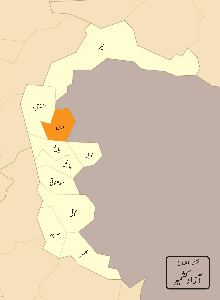Jhelum Valley District

Hattian Bala is one of the ten districts of Azad Kashmir, Pakistan. Its district headquarters is in the town of Jhelum Valley.
History
Before the establishment of the Azad Kashmir in 1948 it was the part of the Baramula district, tehsil Uri (now in Indian Kashmir). After ceasefire during the first war between India and Pakistan Jhelum Valley became part of Muzaffarabad District until 2009. It was announced district in July 2009 during the coalition government of Sardar Muhammad Yaqoob Khan. Newly established district is the Gateway to Srinagar with 0.3 million population.
Indian controlled district Baramula is located in the east of Jhelum Valley while Kapwara of Indian Kashmir is in the northeast, Neelum district of AJK in the northwest, Muzaffarabad in the west and Bagh in the south.
Economy
The rural urban ratio is 90:10. The majority of the rural population depends on agriculture, livestock and forestry for its subsistence. Many people are working or settled abroad in the Middle East, UK and United States and they support their families behind and in the development of the area. Jhelum Valley is a mainly hilly and mountainous region with stretches of plains along the riverside, the river Jehlum which enters from the Chakothi LoC point and passes through the Jehlum valley flowing east to northwest. Due to fast flowing winding streams, Jhelum Valley has great potential to generate hydroelectricity. Hydro power stations are Kathai, Leepa, and Sharian. The district has much natural beauty, its mountains have beautiful valleys like Leepa, Khalana Chham, Ghail, Saina Daman Chamm, Dhani Shahdarrah, Charoi and Chakar Salmia
Land of Saints
Jhelum Valley is the land of many famous saints and Sufia-e-Karams. Hafiz Jamal-ud-Din of Bani Hafiz Shareef, Mian Muhammad Jee, Hafiz Mian Muhammad Younis and Hafiz Abdul Qadus (Molvi Baji) of Bani Hafiz, Peer Sikndar Shah Sahib of Hattian Shareef, Sain Mitha Bajee of Tareda (Karnah). Baba Zinda pir Nogran (نوگراں)
Prominent Political Figures
Raja Muhammad Hiadar Khan was the first prominent political figure from District Hattian Bala (old name) in State Of Azad Kashmir. Raja Muhammad Haider Khan (Late) led the Muslim Conference being the President of Muslim Conference two times i.e. in 1960 & 1963.
Sahibzada Muhammad Ishaq Zaffar (Late) who belonged to a very famous spiritual family of Bani Hafiz remained as a President, Prime Minister, Speaker and Senior Minister of Constituent Assembly of Azad Jammu & Kashmir. He also acted as Party President of Pakistan Peoples Party (PPP) AJ&K. He was one of the founding member of Pakistan Peoples Party Azad Kashmir and a member of senior central executive committee of Peoples Party Pakistan (PPP). Being a master in oratory and his selfless commitment to his party and incessant love and care for party workers he was also known as "Bhutto" of Kashmir.
Raja Muhammad Farooq Haider Khan belongs to well known political family & inherited the career from his family, his father Raja Muhammad Haider Khan (Late) led the Muslim Conference being the President of Muslim Conference two times i.e. in 1960 & 1963. His mother Mohterma Saeeda Khan (late) holds the honor to be the first female Member of AJ&K Legislative Assembly in the history of Azad Jammu & Kashmir.Raja Farooq Haider Khan is the former Prime Minister of state of Azad Jammu & Kashmir who took the office of premiership in 2009 and at present he is the party President of Muslim League Nawaz Azad Jammu & KashmiSardar
Sardar Ali Khan Chughtai belongs to the ancient political family. He is one of the greatest names of district Jhelum Valley. He remained minister in Azad Kashmir Govt. for more than a decade. He served the district efficiently and provided the people with the basic infrastructure in the form of roads, water supply and electricity.
Demography
Jhelum Valley has a 100% Muslim population with a majority of Sunni Muslims about 96% and 4% Shia. About 5% of its present population migrated from Indian Kashmir during 1947-48, 1965 and after 1989s separatist disturbances. A very few number of Afghan refugees have also now settled in some urban parts of the district. Main tribes are Gujjars, Rajputs, Mughals, Abbasi, Syeds, kianis, Awans, Dar, Lone, Khawaja Khiljee
.
Languages
Urdu, Pahari (with a slight difference in dialect), Gojri and Kashmiri.
Administrative divisions
Jhelum Valley Districts consists of three tehsils:[1]
The district council of Jhelum Valley has 12 union councils (comprising 8 UCs from Constituency No.5 and 4 UCs from Constituency No.6), one municipal committee at Hattian, and one town committee at Chikar.
The rural development department has 3 Markz (centers): Hattian, Leepa and Chikar. Assistant Director LG&RDD Hattian is the administrative officer for the rural development with 2 project managers at each center.
Education
According to the Alif Ailaan Pakistan District Education Rankings 2015, Jhelum Valley is ranked 28 out of 148 districts in terms of education. For facilities and infrastructure, the district is ranked 112 out of 148.[2] There are few of colleges mostly people studied from Allama Iqbal Open University. District have some private institutions like READ Foundation Science College Hattian Bala READ Foundation Science College Chanari and Smart School Hattian Bala.
References
- ↑ "Hattian Bala". http://tourism.mypakistan.pk. Retrieved 7 July 2013. External link in
|publisher=(help) - ↑ "Individual district profile link, 2015". Alif Ailaan. Retrieved 2015-05-06.
Coordinates: 34°10′09″N 73°44′36″E / 34.1691°N 73.7432°E
